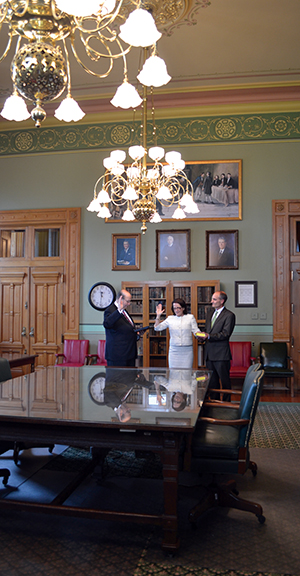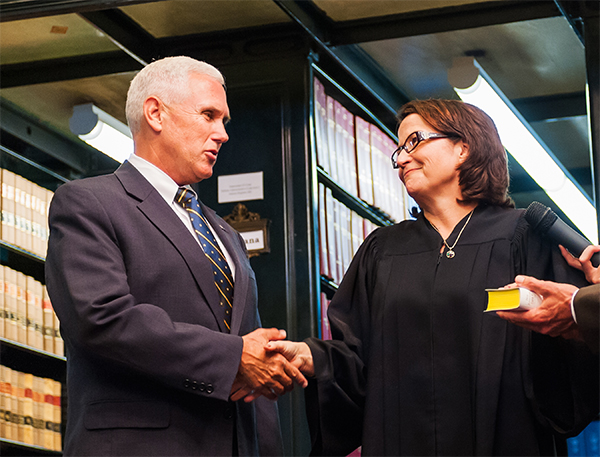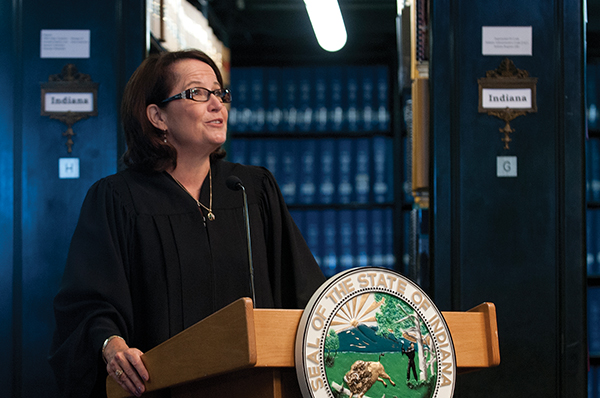Continued emphasis on fair and impartial justice as Dickson transfers leadership to Rush
On June 11, 2014, Brent E. Dickson announced he would step down as Chief Justice of Indiana before September first and continue serving as an Associate Justice on the five-member Supreme Court. When Dickson informed the Judicial Nominating Commission of his plans, he said, “It has been a great joy and a privilege to have helped continue the Court’s tradition of excellence—especially with four hard-working colleagues who are devoted to the law.” He further observed, “I am looking forward to being able to spend most of my time in legal research, deciding cases, and writing opinions.” Justice Dickson faces mandatory retirement effective in July 2016 when he turns 75.

Dickson became Chief Justice in May 2012 after serving as Acting Chief Justice following the retirement of Randall T. Shepard. The Commission unanimously voted for Dickson—who had served on the Court for 26 years as an Associate Justice—to become Chief Justice. A public investiture ceremony took place in August 2012.
Appointed to the Court in 1986 as the 100th Justice, Dickson had been urged to accept the position to provide stability and continuity to the judicial branch. Dickson explained, “Knowing that my tenure as Chief Justice was limited, each Associate Justice has actively participated in much of the administrative responsibilities and decisions of the office of Chief Justice.” He observed, “The time is right for this transition. The Court and state will be well served when one of my colleagues is selected as the next Chief Justice.”
On August 6th, the seven-member Judicial Nominating Commission selected Justice Loretta H. Rush to serve as the next leader of the high court. The Commission, chaired by Chief Justice Dickson, includes three attorneys elected by their peers and three citizens (two were appointed by Governor Mike Pence and one appointed by Governor Mitch Daniels). Along with its primary responsibility of filling appellate court vacancies, the members are also responsible for selecting a Chief Justice to serve for a five-year term.
The Commission interviewed Associate Justices Rush, Mark Massa, Steven David and Robert Rucker in a meeting open to the public and press in the Supreme Court’s conference room in the Indiana State House. Immediately following the interviews, the Commission met privately. Following their executive session, the Commission convened publicly to vote on its selection of Indiana’s next Chief Justice. The Commission unanimously selected Rush.
Loretta H. Rush was appointed to the Indiana Supreme Court by Governor Mitch Daniels in September 2012. She took the oath of office as Indiana’s 108th Supreme Court Justice on November 7, 2012. Prior to her appointment, she was a practicing lawyer in Lafayette for 15 years and then elected Tippecanoe Superior Court 3 judge and served for 14 years.
As a Supreme Court Justice, Rush serves as Chair of the Commission on Improving the Status of Children in Indiana and the Indiana Conference for Legal Education Opportunity (CLEO). She serves as the Court’s liaison to the Judicial Conference’s Juvenile Justice Improvement and Problem-Solving Courts committees and the State Board of Law Examiners. She has been appointed multiple times to attend the National Judicial Leadership Summit on the Protection of Children.

As juvenile court judge in Tippecanoe County she assisted with the creation of the county’s Court Appointed Special Advocate (CASA) program. She also implemented a certified juvenile drug treatment court and initiated a twenty-four-hour assessment center for youth. During her tenure, she helped initiate, develop and sustain more than twenty-five youth programs. Prior to that she spent 15 years in general legal practice and eventually became a partner at a Lafayette firm.
Rush was born in 1958 in Pennsylvania and moved frequently as a child including Lake County before settling permanently in Indiana in 1972. She earned her undergraduate degree from Purdue University with honors and graduated cum laude from the Indiana University Maurer School of Law in Bloomington. She now serves as a member of the law school’s Board of Visitors.
Justice Rush is a member of the Tippecanoe, Indiana, Indianapolis, Seventh Circuit and American Bar Associations; and Indiana and National Council of Juvenile and Family Court Judges. Justice Rush was selected as one of Indianapolis Business Journal’s 2013 “Women of Influence.” In 2003, she was honored to receive the Kinsey Award for Juvenile Judge of the Year and was presented with the Fiscal Responsibility Award by the Tippecanoe County Council and Commissioners in 2001.

She is married with four children and enjoys cooking, outdoor activities and time with family and friends.
Justice Rush spoke to the press immediately after being named Chief Justice and said, “This is not about one person; it is about the five members of the court continuing to uphold the rule of law.” She thanked each of her colleagues, pointing specifically to Justice Dickson and Justice Robert Rucker who combined have 43 years of experience on the Court. “I am grateful they will both continue to serve.”
On August 18, 2014 Rush was sworn in as Indiana’s first female Chief Justice in a small ceremony in the Supreme Court law library. Governor Mike Pence administered the Oath of Office. Rush described the library as the “jewel of the State House” and noted the library’s collection as representative of “our branch of government’s core purpose: to administer fair, impartial, effective justice.”
During her remarks, Chief Justice Rush discussed her favorite provision of the Indiana Constitution, Article 1, Section 12 which determines, “All courts shall be open…and every person…shall have remedy by due course of law.” With the strength of the Court based on the collective wisdom all five justices, she pledged the Court’s continued role in upholding the rule of law to ensure fairness and justice in Indiana courts.